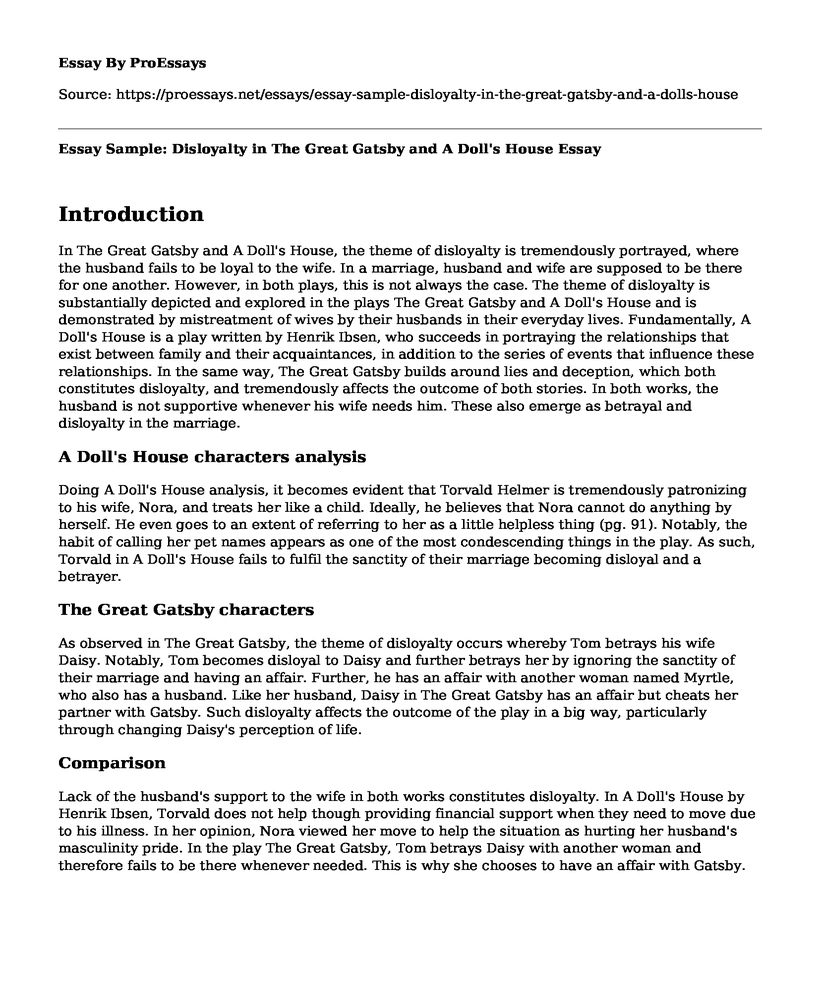Introduction
In The Great Gatsby and A Doll's House, the theme of disloyalty is tremendously portrayed, where the husband fails to be loyal to the wife. In a marriage, husband and wife are supposed to be there for one another. However, in both plays, this is not always the case. The theme of disloyalty is substantially depicted and explored in the plays The Great Gatsby and A Doll's House and is demonstrated by mistreatment of wives by their husbands in their everyday lives. Fundamentally, A Doll's House is a play written by Henrik Ibsen, who succeeds in portraying the relationships that exist between family and their acquaintances, in addition to the series of events that influence these relationships. In the same way, The Great Gatsby builds around lies and deception, which both constitutes disloyalty, and tremendously affects the outcome of both stories. In both works, the husband is not supportive whenever his wife needs him. These also emerge as betrayal and disloyalty in the marriage.
A Doll's House characters analysis
Doing A Doll's House analysis, it becomes evident that Torvald Helmer is tremendously patronizing to his wife, Nora, and treats her like a child. Ideally, he believes that Nora cannot do anything by herself. He even goes to an extent of referring to her as a little helpless thing (pg. 91). Notably, the habit of calling her pet names appears as one of the most condescending things in the play. As such, Torvald in A Doll's House fails to fulfil the sanctity of their marriage becoming disloyal and a betrayer.
The Great Gatsby characters
As observed in The Great Gatsby, the theme of disloyalty occurs whereby Tom betrays his wife Daisy. Notably, Tom becomes disloyal to Daisy and further betrays her by ignoring the sanctity of their marriage and having an affair. Further, he has an affair with another woman named Myrtle, who also has a husband. Like her husband, Daisy in The Great Gatsby has an affair but cheats her partner with Gatsby. Such disloyalty affects the outcome of the play in a big way, particularly through changing Daisy's perception of life.
Comparison
Lack of the husband's support to the wife in both works constitutes disloyalty. In A Doll's House by Henrik Ibsen, Torvald does not help though providing financial support when they need to move due to his illness. In her opinion, Nora viewed her move to help the situation as hurting her husband's masculinity pride. In the play The Great Gatsby, Tom betrays Daisy with another woman and therefore fails to be there whenever needed. This is why she chooses to have an affair with Gatsby.
Conclusion
In conclusion, the husbands in both plays demonstrate disloyalty to their wives and are observed through mistreatment in their everyday lives, in addition to failing to provide support. The betrayal as a form of disloyalty as used by the authors play important roles in changing the outcome of both stories. The authors have therefore used disloyalty as a means in which characters can get whatever they want.
Cite this page
Essay Sample: Disloyalty in The Great Gatsby and A Doll's House. (2021, Mar 31). Retrieved from https://proessays.net/essays/essay-sample-disloyalty-in-the-great-gatsby-and-a-dolls-house
If you are the original author of this essay and no longer wish to have it published on the ProEssays website, please click below to request its removal:
- Essay on Othello Status as an Outsider
- Critical Essay on Frank Kafka's Metamorphosis
- Literary Analysis Essay on Connection Between Gender and Class in Respectable Woman by Kate Chopin
- Major Attributes of the Portrayal of Nature in Wordsworth's Poetry Essay
- Essay Sample on Identity Pursuit in the Gilgamesh Mythological Story
- "The Tell-Tale Heart" by Edgar Allen Poe: The Use of Imagery and Literary Devices
- Essay Example on Iago's Cunning Plan to Sabotage Othello and Desdemona







